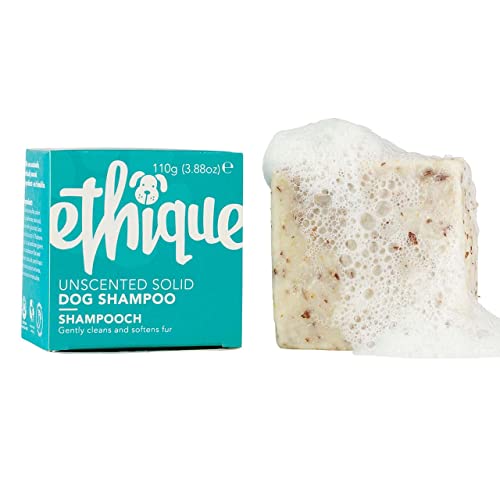
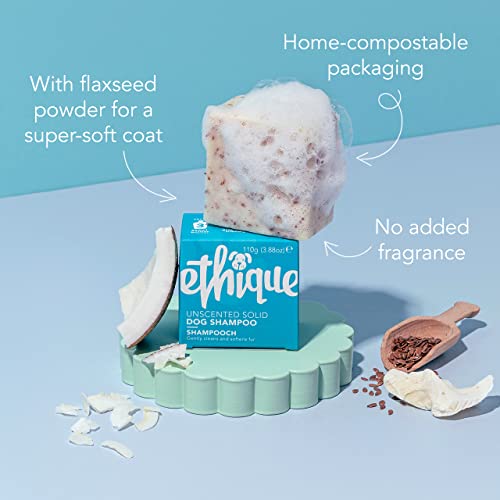
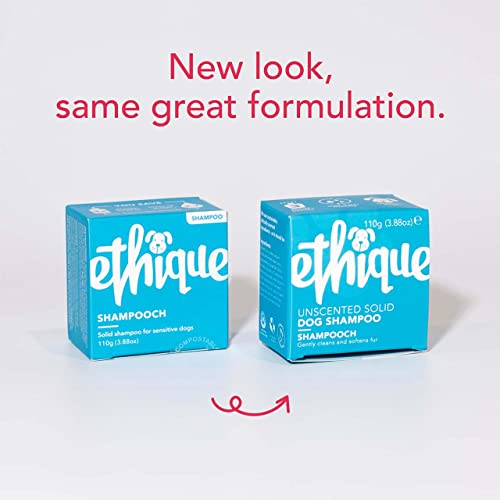
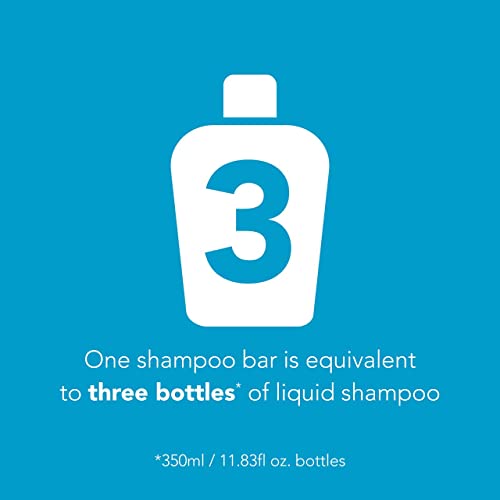
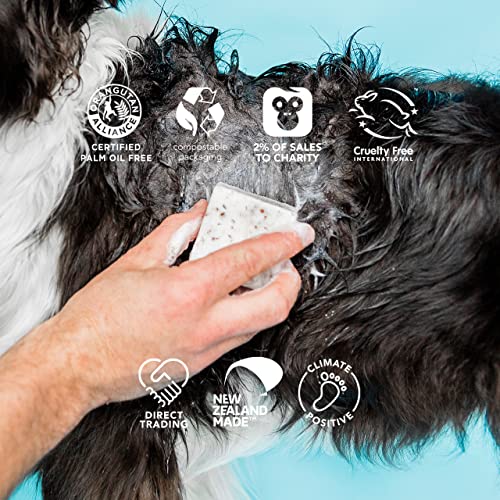
Ethique Dog Shampoo - Gentle Formula for Sensitive Skin, Plastic-Free, Vegan - 3.88 oz


Lactic Acid, L
High RiskLactic acid is an organic acid commonly used in cosmetics and skincare products as an exfoliant and pH regulator. It helps in improving skin texture and hydration by promoting the shedding of dead skin cells and enhancing moisture retention.
Sustai Insights
Lactic acid offers functional benefits as an effective exfoliant and moisturizer, contributing to improved skin appearance. However, it poses potential risks, including skin irritation and enhanced absorption, which may lead to adverse effects. Regulatory bodies have noted use restrictions due to these concerns. Overall, the ingredient is considered high risk, necessitating cautious usage, particularly for sensitive skin. Alternatives like glycolic acid may provide similar benefits with potentially lower irritation.
Behenyl Trimonium Methosulfate
Medium RiskBehentrimonium methosulfate is a quaternary ammonium compound commonly used in personal care products as a conditioning agent. It functions effectively as a surfactant and emulsifier, helping to improve the texture and application of formulations, especially in hair care and skin products.
Sustai Insights
Behentrimonium methosulfate offers functional benefits as a conditioning agent, enhancing product performance in hair and skin applications. It is considered to have low health risks, with minimal concerns for carcinogenicity, allergies, or reproductive toxicity. Environmental risks are also low, with no evidence of bioaccumulation. However, regulatory bodies note some restrictions on its use in verified products. Overall, the ingredient presents a medium risk profile, highlighting the importance of adhering to safe usage practices and considering alternatives when available.
Caprylic Triglyceride
Low RiskCaprylic triglyceride is an ester derived from coconut oil and glycerin, commonly used in cosmetic formulations as an emollient, stabilizer, and skin-conditioning agent. It helps to improve the texture and spreadability of products while providing a lightweight, non-greasy feel.
Sustai Insights
Caprylic triglyceride offers functional benefits such as enhanced skin moisturization and improved formulation stability. It is generally regarded as safe, with low concerns regarding carcinogenicity, allergenic potential, and reproductive toxicity. Environmental impact is minimal, with no significant pollutant or bioaccumulative properties identified. Regulatory bodies have not issued warnings or restrictions. Overall, the risk level is low, making it a suitable ingredient in cosmetic products. Safe usage practices include adhering to recommended concentrations, and while there are alternatives, caprylic triglyceride remains a reliable choice.
Theobroma Cacao (Cocoa) Seed Butter
Low RiskTheobroma cacao (cocoa) seed butter is extracted from the roasted seeds of the cocoa plant. It is commonly used in cosmetics and skincare products for its emollient properties, helping to moisturize and soften the skin. Cocoa butter is also known for its stability and resistance to rancidity.
Sustai Insights
Cocoa butter is recognized for its effective moisturizing properties and is sustainably sourced, contributing to its appeal in personal care products. It poses low health risks, with minimal concerns regarding carcinogenicity, allergies, or reproductive toxicity. Environmentally, it does not significantly contribute to pollution or bioaccumulation. Regulatory bodies impose few restrictions, affirming its safety. Overall, the risk associated with cocoa seed butter is low, making it a favorable ingredient in cosmetics. Alternatives include shea butter or plant oils for similar emollient benefits.
Sodium Coco Sulfate
Low RiskSodium coco-sulfate is a sodium salt of the fatty acids derived from coconut oil. It primarily functions as a surfactant and cleansing agent in cosmetic formulations, helping to create lather and remove dirt and oils from the skin and hair.
Sustai Insights
Sodium coco-sulfate offers effective cleansing properties and is often considered biodegradable, contributing to its sustainability credentials. Health risks are minimal, with low concerns for carcinogenicity, allergies, and reproductive toxicity. Environmental risks are also low, excluding significant pollutant potential. Regulatory bodies have not issued major restrictions, confirming its safety for use. Overall, it is assessed with a low risk level. For those seeking alternatives, other milder surfactants like decyl glucoside may be considered.
Vegetarian Glycerin
Low RiskVegetarian glycerin, also known as glycerol, is a colorless, odorless, and viscous liquid derived from plant sources. It is primarily used as a humectant, solvent, and emollient in various personal care products, helping to retain moisture and improve texture.
Sustai Insights
Vegetarian glycerin offers functional benefits as an effective humectant, promoting hydration and skin smoothness. It is biodegradable and typically sustainably sourced. Health risks associated with glycerin are low, with no significant concerns for carcinogenicity, allergens, or reproductive toxicity. Environmental risks are minimal, and it is not subject to major regulatory warnings. Overall, the risk level for this ingredient is low, making it a safe choice in formulations. Safe usage practices include ensuring proper concentrations in products, and alternatives such as propylene glycol exist but may have differing properties.
Cocos Nucifera (Coconut) Oil
Low RiskCocos Nucifera (Coconut) Oil is derived from the kernels of the coconut palm. It is primarily used in cosmetic formulations for its emollient and moisturizing properties, making it suitable for skin and hair care products.
Sustai Insights
Coconut oil serves as an effective moisturizer and emollient, promoting skin hydration and softness. It is sustainably sourced and biodegradable. Health risks are minimal, with low concerns regarding carcinogenicity, allergens, and reproductive toxicity. Environmental impact is also low, as it does not contribute significantly to pollution or bioaccumulation. Regulatory bodies have not issued restrictions on its use. Overall, coconut oil presents a low risk for health and environmental concerns, making it a safe ingredient in cosmetic products.
Sodium Cocoyl Isethionate
Low RiskSodium cocoyl isethionate is a surfactant derived from coconut oil, commonly used in cosmetic formulations. It functions as a cleansing and foaming agent, contributing to the texture and effectiveness of personal care products such as shampoos and body washes. It helps to remove dirt and oils from the skin and hair.
Sustai Insights
Sodium cocoyl isethionate offers functional benefits as a gentle surfactant that effectively cleanses without stripping moisture. It is biodegradable and derived from renewable sources, enhancing its sustainability profile. Health risks are low, with minimal potential for irritation or allergies noted. Regulatory bodies have not imposed significant restrictions, indicating a favorable risk assessment overall. Usage should be within recommended concentrations to maintain safety. Alternatives include milder surfactants like decyl glucoside for those seeking gentler options. Overall, the ingredient is assessed to have a low risk.
Cocoyl Methyl Glucamide
Low RiskCocoyl methyl glucamide is a surfactant derived from coconut fatty acids and methyl glucamine. It serves primarily as a cleansing agent and emulsifier in personal care products, contributing to the formulation's texture and stability while aiding in the removal of dirt and oils from the skin or hair.
Sustai Insights
Cocoyl methyl glucamide offers functional benefits as a mild surfactant and emulsifier, making it suitable for sensitive skin formulations. It is biodegradable and typically derived from renewable resources, aligning with sustainability goals. Health risks are low, with no significant concerns regarding carcinogenicity, allergies, or reproductive toxicity noted. Environmental risks are minimal, as it does not contribute to significant pollution or bioaccumulation. Regulatory assessments indicate no current restrictions on its use, reinforcing its low-risk profile. Overall, it is recommended for safe usage in personal care products, with alternatives available for those seeking different surfactant options.
Sodium Isethionate
Low RiskSodium isethionate is an organic salt commonly used in cosmetic formulations as a surfactant and cleansing agent. It aids in the removal of dirt and oil from the skin, enhancing the overall efficacy of personal care products such as shampoos and body washes.
Sustai Insights
Sodium isethionate offers functional benefits as a mild surfactant, making it effective in cleansing formulations while minimizing irritation. It is considered to have low health risks, with no significant concerns regarding carcinogenicity, allergies, or reproductive toxicity. Environmentally, it poses minimal risks, being non-bioaccumulative and not a major pollutant. Regulatory assessments indicate it’s approved in multiple regions with few restrictions. Usage should be aligned with recommended concentrations to ensure safety. Overall, sodium isethionate is classified as a low-risk ingredient, with no notable adverse effects.
Stearic Acid
Low RiskStearic acid is a naturally occurring fatty acid commonly found in animal and vegetable fats. It functions primarily as an emulsifier, thickener, and stabilizer in cosmetic and personal care products, providing texture and consistency.
Sustai Insights
Stearic acid offers functional benefits such as effective emulsification and stabilization of formulations. It is derived from renewable sources and is biodegradable, contributing to its sustainability profile. Health risks are low, with minimal concerns regarding carcinogenicity, allergies, or reproductive toxicity. Environmental risks are also low, with no significant pollutants or bioaccumulation concerns noted. Regulatory bodies, including the FDA, do not impose restrictions on its use. Overall, stearic acid is assessed as low risk, and its safe usage practices are well-established, with no significant alternatives needed.
Caprylic Triglyceride
Low RiskCaprylic triglyceride is an ester derived from coconut oil and glycerin, commonly used in cosmetic formulations as an emollient, stabilizer, and skin-conditioning agent. It helps to improve the texture and spreadability of products while providing a lightweight, non-greasy feel.
Sustai Insights
Caprylic triglyceride offers functional benefits such as enhanced skin moisturization and improved formulation stability. It is generally regarded as safe, with low concerns regarding carcinogenicity, allergenic potential, and reproductive toxicity. Environmental impact is minimal, with no significant pollutant or bioaccumulative properties identified. Regulatory bodies have not issued warnings or restrictions. Overall, the risk level is low, making it a suitable ingredient in cosmetic products. Safe usage practices include adhering to recommended concentrations, and while there are alternatives, caprylic triglyceride remains a reliable choice.
Theobroma Cacao (Cocoa) Seed Butter
Low RiskTheobroma cacao (cocoa) seed butter is extracted from the roasted seeds of the cocoa plant. It is commonly used in cosmetics and skincare products for its emollient properties, helping to moisturize and soften the skin. Cocoa butter is also known for its stability and resistance to rancidity.
Sustai Insights
Cocoa butter is recognized for its effective moisturizing properties and is sustainably sourced, contributing to its appeal in personal care products. It poses low health risks, with minimal concerns regarding carcinogenicity, allergies, or reproductive toxicity. Environmentally, it does not significantly contribute to pollution or bioaccumulation. Regulatory bodies impose few restrictions, affirming its safety. Overall, the risk associated with cocoa seed butter is low, making it a favorable ingredient in cosmetics. Alternatives include shea butter or plant oils for similar emollient benefits.
Lactic Acid, L
High RiskLactic acid is an organic acid commonly used in cosmetics and skincare products as an exfoliant and pH regulator. It helps in improving skin texture and hydration by promoting the shedding of dead skin cells and enhancing moisture retention.
Sustai Insights
Lactic acid offers functional benefits as an effective exfoliant and moisturizer, contributing to improved skin appearance. However, it poses potential risks, including skin irritation and enhanced absorption, which may lead to adverse effects. Regulatory bodies have noted use restrictions due to these concerns. Overall, the ingredient is considered high risk, necessitating cautious usage, particularly for sensitive skin. Alternatives like glycolic acid may provide similar benefits with potentially lower irritation.
Sodium Coco Sulfate
Low RiskSodium coco-sulfate is a sodium salt of the fatty acids derived from coconut oil. It primarily functions as a surfactant and cleansing agent in cosmetic formulations, helping to create lather and remove dirt and oils from the skin and hair.
Sustai Insights
Sodium coco-sulfate offers effective cleansing properties and is often considered biodegradable, contributing to its sustainability credentials. Health risks are minimal, with low concerns for carcinogenicity, allergies, and reproductive toxicity. Environmental risks are also low, excluding significant pollutant potential. Regulatory bodies have not issued major restrictions, confirming its safety for use. Overall, it is assessed with a low risk level. For those seeking alternatives, other milder surfactants like decyl glucoside may be considered.
Vegetarian Glycerin
Low RiskVegetarian glycerin, also known as glycerol, is a colorless, odorless, and viscous liquid derived from plant sources. It is primarily used as a humectant, solvent, and emollient in various personal care products, helping to retain moisture and improve texture.
Sustai Insights
Vegetarian glycerin offers functional benefits as an effective humectant, promoting hydration and skin smoothness. It is biodegradable and typically sustainably sourced. Health risks associated with glycerin are low, with no significant concerns for carcinogenicity, allergens, or reproductive toxicity. Environmental risks are minimal, and it is not subject to major regulatory warnings. Overall, the risk level for this ingredient is low, making it a safe choice in formulations. Safe usage practices include ensuring proper concentrations in products, and alternatives such as propylene glycol exist but may have differing properties.
Behenyl Trimonium Methosulfate
Medium RiskBehentrimonium methosulfate is a quaternary ammonium compound commonly used in personal care products as a conditioning agent. It functions effectively as a surfactant and emulsifier, helping to improve the texture and application of formulations, especially in hair care and skin products.
Sustai Insights
Behentrimonium methosulfate offers functional benefits as a conditioning agent, enhancing product performance in hair and skin applications. It is considered to have low health risks, with minimal concerns for carcinogenicity, allergies, or reproductive toxicity. Environmental risks are also low, with no evidence of bioaccumulation. However, regulatory bodies note some restrictions on its use in verified products. Overall, the ingredient presents a medium risk profile, highlighting the importance of adhering to safe usage practices and considering alternatives when available.
Cocos Nucifera (Coconut) Oil
Low RiskCocos Nucifera (Coconut) Oil is derived from the kernels of the coconut palm. It is primarily used in cosmetic formulations for its emollient and moisturizing properties, making it suitable for skin and hair care products.
Sustai Insights
Coconut oil serves as an effective moisturizer and emollient, promoting skin hydration and softness. It is sustainably sourced and biodegradable. Health risks are minimal, with low concerns regarding carcinogenicity, allergens, and reproductive toxicity. Environmental impact is also low, as it does not contribute significantly to pollution or bioaccumulation. Regulatory bodies have not issued restrictions on its use. Overall, coconut oil presents a low risk for health and environmental concerns, making it a safe ingredient in cosmetic products.
Sodium Cocoyl Isethionate
Low RiskSodium cocoyl isethionate is a surfactant derived from coconut oil, commonly used in cosmetic formulations. It functions as a cleansing and foaming agent, contributing to the texture and effectiveness of personal care products such as shampoos and body washes. It helps to remove dirt and oils from the skin and hair.
Sustai Insights
Sodium cocoyl isethionate offers functional benefits as a gentle surfactant that effectively cleanses without stripping moisture. It is biodegradable and derived from renewable sources, enhancing its sustainability profile. Health risks are low, with minimal potential for irritation or allergies noted. Regulatory bodies have not imposed significant restrictions, indicating a favorable risk assessment overall. Usage should be within recommended concentrations to maintain safety. Alternatives include milder surfactants like decyl glucoside for those seeking gentler options. Overall, the ingredient is assessed to have a low risk.
Cocoyl Methyl Glucamide
Low RiskCocoyl methyl glucamide is a surfactant derived from coconut fatty acids and methyl glucamine. It serves primarily as a cleansing agent and emulsifier in personal care products, contributing to the formulation's texture and stability while aiding in the removal of dirt and oils from the skin or hair.
Sustai Insights
Cocoyl methyl glucamide offers functional benefits as a mild surfactant and emulsifier, making it suitable for sensitive skin formulations. It is biodegradable and typically derived from renewable resources, aligning with sustainability goals. Health risks are low, with no significant concerns regarding carcinogenicity, allergies, or reproductive toxicity noted. Environmental risks are minimal, as it does not contribute to significant pollution or bioaccumulation. Regulatory assessments indicate no current restrictions on its use, reinforcing its low-risk profile. Overall, it is recommended for safe usage in personal care products, with alternatives available for those seeking different surfactant options.
Sodium Isethionate
Low RiskSodium isethionate is an organic salt commonly used in cosmetic formulations as a surfactant and cleansing agent. It aids in the removal of dirt and oil from the skin, enhancing the overall efficacy of personal care products such as shampoos and body washes.
Sustai Insights
Sodium isethionate offers functional benefits as a mild surfactant, making it effective in cleansing formulations while minimizing irritation. It is considered to have low health risks, with no significant concerns regarding carcinogenicity, allergies, or reproductive toxicity. Environmentally, it poses minimal risks, being non-bioaccumulative and not a major pollutant. Regulatory assessments indicate it’s approved in multiple regions with few restrictions. Usage should be aligned with recommended concentrations to ensure safety. Overall, sodium isethionate is classified as a low-risk ingredient, with no notable adverse effects.
Stearic Acid
Low RiskStearic acid is a naturally occurring fatty acid commonly found in animal and vegetable fats. It functions primarily as an emulsifier, thickener, and stabilizer in cosmetic and personal care products, providing texture and consistency.
Sustai Insights
Stearic acid offers functional benefits such as effective emulsification and stabilization of formulations. It is derived from renewable sources and is biodegradable, contributing to its sustainability profile. Health risks are low, with minimal concerns regarding carcinogenicity, allergies, or reproductive toxicity. Environmental risks are also low, with no significant pollutants or bioaccumulation concerns noted. Regulatory bodies, including the FDA, do not impose restrictions on its use. Overall, stearic acid is assessed as low risk, and its safe usage practices are well-established, with no significant alternatives needed.
Discover the Ethique Shampooch Unscented Solid Dog Shampoo, specially formulated for sensitive dogs. This eco-friendly, plastic-free shampoo bar not only makes bath time a breeze but also nurtures your pet's delicate skin with flaxseed and coconut oil for a shiny coat. Ideal for conscientious pet owners, this shampoo is the perfect blend of health and sustainability.
- Gentle Care for Sensitive Skin: This unscented bar ensures a soothing wash for even the most delicate doggy skin.
- Eco-Friendly Packaging: Packaged in recyclable, compostable cardboard, this shampoo bar reduces plastic waste and nourishes the earth when disposed of properly.
- Cost-Effective: One bar is equivalent to three bottles of liquid shampoo, offering great value and lasting use for your furry friend.
- Sustainable Ingredients: Crafted from sustainably sourced ingredients, this product is vegan, cruelty-free, and palm oil-free, aligning with eco-conscious values.
- Positive Environmental Impact: Ethique donates 2% of sales to environmental organizations, making every purchase a step toward a healthier planet.
Subscribe & Save with Sustai
- Best Price Guarantee: Always enjoy the lowest prices on sustainable home essentials.
- No Surprises: We’ll notify you before shipping. No hidden fees, ever.
- You’re in Charge: Change, pause, or cancel your subscription anytime with ease.
- Eco-Friendly Deliveries: Our grouped shipments mean less packaging and lower emissions.
Join us on a sustainable journey. Special offers for a limited time! Prices and promotions may change.
Recommended Products
Discover the Ethique Shampooch Unscented Solid Dog Shampoo, specially formulated for sensitive dogs. This eco-friendly, plastic-free shampoo bar not only makes bath time a breeze but also nurtures your pet's delicate skin with flaxseed and coconut oil for a shiny coat. Ideal for conscientious pet owners, this shampoo is the perfect blend of health and sustainability.
- Gentle Care for Sensitive Skin: This unscented bar ensures a soothing wash for even the most delicate doggy skin.
- Eco-Friendly Packaging: Packaged in recyclable, compostable cardboard, this shampoo bar reduces plastic waste and nourishes the earth when disposed of properly.
- Cost-Effective: One bar is equivalent to three bottles of liquid shampoo, offering great value and lasting use for your furry friend.
- Sustainable Ingredients: Crafted from sustainably sourced ingredients, this product is vegan, cruelty-free, and palm oil-free, aligning with eco-conscious values.
- Positive Environmental Impact: Ethique donates 2% of sales to environmental organizations, making every purchase a step toward a healthier planet.

You can have at most 2 Sustainable Steals products in your cart
Customer Reviews
Customers’ View
Customers appreciate the effectiveness and eco-friendly nature of Ethique's Shampooch Unscented Solid Dog Shampoo. Many praise its gentle formula, which is particularly suited for sensitive skin, noting that it leaves their pets' coats clean, soft, and free from irritation. One user highlighted, "He rinsed easily & was quite happy after. It's been a week now & no itching and no perfume smell." Additionally, the shampoo bar's ease of use is frequently mentioned, with customers finding it simpler than traditional liquid shampoos. The product's sustainable packaging and long-lasting nature—replacing three bottles of liquid shampoo—resonate well with environmentally conscious buyers. While opinions on the scent vary, overall, customers find this product effective and aligned with their sustainable lifestyle.
AI-generated from the text of customer reviewsThis product is rated 5.0 of 5.0 stars.
It has received 1 review.




